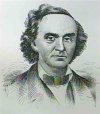 After the Confederates fired on Fort Sumter on April 12, 1861 and Lincoln issued his call for 75,000 volunteers on April 15th, Missouri Governor Claiborne Fox Jackson provided his answer on April 17th:
After the Confederates fired on Fort Sumter on April 12, 1861 and Lincoln issued his call for 75,000 volunteers on April 15th, Missouri Governor Claiborne Fox Jackson provided his answer on April 17th: After the Confederates fired on Fort Sumter on April 12, 1861 and Lincoln issued his call for 75,000 volunteers on April 15th, Missouri Governor Claiborne Fox Jackson provided his answer on April 17th:
After the Confederates fired on Fort Sumter on April 12, 1861 and Lincoln issued his call for 75,000 volunteers on April 15th, Missouri Governor Claiborne Fox Jackson provided his answer on April 17th:
"Sir, ... your requisition in my judgment, is illegal, unconstitutional and revolutionary in its object, inhuman and diabolical, and cannot be complied with. Not one man will the state of Missouri furnish to carry on such an unholy crusade."
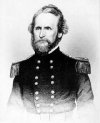 Tensions in Missouri were high. Jackson called out the Missouri State Guard to come together for training. Captain Nathaniel Lyon, the Union commander of the Federal Arsenal in St. Louis, Missouri had begun to muster and arm pro-Union volunteers. On May 10th Lyon, now a Brigadier General, marched his force of Federal volunteers out to an encampment of Missouri State Guard. Lyon's forces surrounded what was called Camp Jackson and forced the surrender of over 600 militiamen. While marching their prisoners back to the arsenal through the streets of St. Louis, the Federals encountered angry civilians. A riot ensued and ended with over 100 civilians being killed or injured.
Tensions in Missouri were high. Jackson called out the Missouri State Guard to come together for training. Captain Nathaniel Lyon, the Union commander of the Federal Arsenal in St. Louis, Missouri had begun to muster and arm pro-Union volunteers. On May 10th Lyon, now a Brigadier General, marched his force of Federal volunteers out to an encampment of Missouri State Guard. Lyon's forces surrounded what was called Camp Jackson and forced the surrender of over 600 militiamen. While marching their prisoners back to the arsenal through the streets of St. Louis, the Federals encountered angry civilians. A riot ensued and ended with over 100 civilians being killed or injured.
As a last ditch effort to preserve the peace in Missouri a meeting was arranged between Brigadier General Nathaniel Lyon, Congressman Frank Blair, Major General Sterling Price and Governor Claiborne Jackson. The meeting was to be held in St. Louis at the Planter's House Hotel and Lyon had guaranteed safe passage for both Price and Jackson. On June 11, 1861, after several hours of contentious discussion, Lyon stood up and declared,
"Rather than concede to the State of Missouri the right to demand that my government shall not enlist troops within her limits, or bring troops into the State whenever it pleases, or move troops at its own will into, out of, or through the State; rather than concede to the State of Missouri for one single instant the right to dictate to my government in any matter, however unimportant, I would see you, and you, and you, and you, [pointing to each man in the room] and every man, woman, and child in the State dead and buried. This means war. In an hour one of my officers will call for you and conduct you out of my lines."
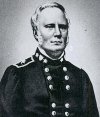 Lyon walked out of the meeting. Missouri would soon be at war. Price and Jackson quickly left St. Louis for Jefferson City to begin preparing for war. Price convinced Jackson that Jefferson City had to be abandoned because it was not easily defended. They went up the river to Boonville, Missouri.
Lyon walked out of the meeting. Missouri would soon be at war. Price and Jackson quickly left St. Louis for Jefferson City to begin preparing for war. Price convinced Jackson that Jefferson City had to be abandoned because it was not easily defended. They went up the river to Boonville, Missouri.
Lyon gathered his forces together and followed, occupying Jefferson City before moving on to Boonville. In Boonville, Price realized that the Missouri State Guard was still too green and too poorly armed to be an effective fighting force and prepared to fight a delaying action against the Federals before withdrawing southwest. On June 17, 1861, Lyon's troops attacked the Missouri State Guard defenders and quickly caused them to withdraw. The Missouri State Guard retreat rapidly turned into a rout. Lyon took possession of Boonville at 11:00 A.M. The Missouri State Guard retreated to southwestern Missouri.
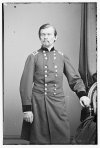 On July 5, 1861, a small detachment of Federals under the command of Colonel Franz Sigel attacked the Missouri State Guard in the Battle of Carthage about ten miles north of Carthage, Missouri. Badly outnumbered, Sigel would immediately begin a withdrawal to Sarcoxie, Missouri while fighting a rear guard action. Elated by their victory over the Federals, the Missouri State Guard would continue their movement south and meet up in northwestern Arkansas with a Confederate force under the command of Confederate Brigadier General Ben McCulloch.
On July 5, 1861, a small detachment of Federals under the command of Colonel Franz Sigel attacked the Missouri State Guard in the Battle of Carthage about ten miles north of Carthage, Missouri. Badly outnumbered, Sigel would immediately begin a withdrawal to Sarcoxie, Missouri while fighting a rear guard action. Elated by their victory over the Federals, the Missouri State Guard would continue their movement south and meet up in northwestern Arkansas with a Confederate force under the command of Confederate Brigadier General Ben McCulloch.
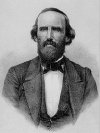 Brigadier General Nathaniel Lyon would march his Federals south, arriving in Springfield, Missouri on July 13th to join up with Sigel. His men were tired and poorly supplied. He soon found out that the Missouri State Guard was nearby and had him outnumbered. He also discovered that McCulloch's Confederate forces were also in the area. Believing that he was greatly outnumbered, Lyon sent dispatches to Fremont and Washington requesting supplies and reinforcements. Lyon was passionate in thinking that the fate of holding onto Missouri for the Union hung in the balance. There would be no reinforcements and supplies were slow in coming. Lyon decided to march south from Springfield in order to engage the Southern forces. It was now August, 1861.
Brigadier General Nathaniel Lyon would march his Federals south, arriving in Springfield, Missouri on July 13th to join up with Sigel. His men were tired and poorly supplied. He soon found out that the Missouri State Guard was nearby and had him outnumbered. He also discovered that McCulloch's Confederate forces were also in the area. Believing that he was greatly outnumbered, Lyon sent dispatches to Fremont and Washington requesting supplies and reinforcements. Lyon was passionate in thinking that the fate of holding onto Missouri for the Union hung in the balance. There would be no reinforcements and supplies were slow in coming. Lyon decided to march south from Springfield in order to engage the Southern forces. It was now August, 1861.
The Union troops were short on rations and their uniforms were wearing out. Little or no rain had fallen for three weeks. A light rain had developed on the evening of August 9th but ended before midnight. During the day the temperature would rise to as high as 110 degrees F. Sunrise occurred around 5:00 A.M. with sunset occurring a little after 7:00 P.M.